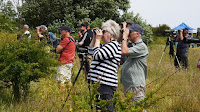There has been much excitement up on the Norfolk Coast near Cromer recently. A colony of about 8 exotic, rainbow coloured birds have been nesting at a quarry near Trimingham since the start of June - and some of the eggs laid there hatched on Wednesday. The farmer who owns nearby land has worked with the RSPB to set up a safe viewing platform, and thousands of birders have already come to watch...
 These birds are European Bee-eaters. They normally breed in
southern and central Europe, & Africa, migrating south to warmer climes in
winter. Merops Apiaster are the two words for bee eater in Ancient Greek and Latin
These birds are European Bee-eaters. They normally breed in
southern and central Europe, & Africa, migrating south to warmer climes in
winter. Merops Apiaster are the two words for bee eater in Ancient Greek and Latin This is only the 6th time this century the birds have bred in Britain. Here are two of the Norfolk visitors.
They are so beautiful. Experts say we do not need to worry about their name - they eat all sorts of different insects, and there is no evidence that the UK bee population is at risk!
Here is a video clip from National Geographic about bee-eaters
The RSPB have set up a live webcam at Trimingham - if you have time to sit and watch a hole in the ground, you may catch a glimpse of these multicolour marvels coming and going.[here] I have dipped into it a few times, and as yet seen nothing - although in the comments, one person said she had heard the birds calling ["They sound like demented oystercatchers"!]
Mark Thomas from the RSPB said this was a very exciting event - but also a sign of climate change - these birds alter their breeding patterns to accommodate global warming, and so these birds nesting in the UK is a real concern. If the baby birds survive, they should fledge around August 19th.




Wonderful to see - but a sign of the times.
ReplyDeleteI imagine that, as a smallholder, you a free more conscious of changes in climate, with crops reaching maturity sooner etc.
DeleteHow fascinating. I read recently that there are various 'new' breeds of birds colonising in parts of England.
ReplyDeleteI think there are a number of "visitors" down in the SW near you. I'm sure the Eden Project team are monitoring these changes
DeleteGoodness how exotic! What beautiful birds. It is worrying though, firstly if they successfully breed will the babies survive, and secondly it shows we are suffering global warming and what will happen to our more temperate species? SueH
ReplyDeleteI think there is some concern about predators. I do hope they survive
DeleteThanks for sharing this-it’s fascinating to see such colourful birds here in Britain. And to all the climate change disbelievers-use your eyes and look around at what’s happening everywhere. Catriona
ReplyDeleteIt is hard to see how anyone can deny what's happening.
DeleteWhat beautiful birds! And a very interesting post.
ReplyDeleteBrings to mind an episode of To The Manor Born.
ReplyDeleteI'd quite forgotten the Birds v Bees episode ( link here https://youtu.be/ypT2GJ6TTZk)
DeleteHow exciting! A reminder that I must try to identify the unusual bird call I have been hearing up in the trees for a couple of weeks, but I don't think it is anything exotic like those.
ReplyDelete❓🦜❓🐦❓🦜❓🐦❓
DeleteThey are lovely, colorful birds, but, as you say, a response to climate change. They are now finding it warm enough in the UK to nest!
ReplyDeleteLovely to see them - but their presence is a cause for concern
Delete